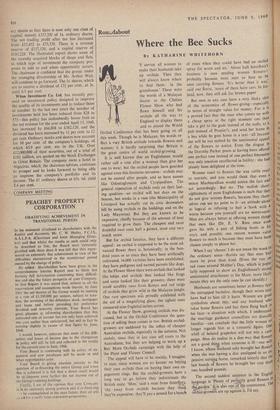RoulAlabout
Where the Bee Sucks
By KATHARINE WHITEHORN `I[ ADVISE all women to make their husbands take up orchids. Then they will always know where to find them: in the greenhouse.' These were the words of a Malayan doctor at the Chelsea Flower Show who had flown himself and his orchids all the way to England to display them this week. Though he is Malayan, his words re- flect a very British attitude towards flowers and women; it is hardly surprising that Britain is the great centre of world orchid-growing.
It is well known that an Englishman would rather call a rose after a woman than give her one to wear; but the orchid people have guarded against even this feminine intrusion : orchids may not be named after people, and so have names like Odontoglossum and Cyrpipedium. The general reputation of orchids rests on their last- ing qualities—an orchid will last days on the bosom, but weeks in a vase (the Municipality of Liverpool has actually cut its civic decoration bill by using orchids in the buildings and on the Lady Mayoress). But they are .known to be expensive; chiefly because of the amount of heat required to grow them. The cheapest and most doubtful root costs half a guinea, most cost very much more.
But for orchid fanatics, they have a different appeal: an orchid is supposed to be the most ad- vanced flower there is, botanically; in the hun- dred years or so since they have been artificially cultivated, 16,000 varieties have been established; they have pedigrees and named parents like dogs.
At the Flower Show there were orchids that looked like tulips and orchids that looked like frogs and some looked like their growers;• there were smaH scrubby ones from. Kenya and red twigs of orchids that grow wild in the Malayan jungle.
One rare specimen was proudly exhibited with the aid of a magnifying glass; the ugliest ones measured nine frightful inches across.
At the Flower Show, growing orchids was dis- cussed, but at the Orchid Conference the ques- tion of selling them comes in too. British orchid- growers are saddened by the influx of cheaper Australian orchids, especially in the autumn. Not unduly, since they in any case sell roots to the Australians; but they are helping to work up a Buy More Orchids campaign with the help of the Plant and Flower Council.
The appeal will have to be mainly, I imagine, to men, since women are no keener on buying their own orchids than on buying their own en- gagement rings. But the orchid-growers have a long way to go before they indoctrinate the British male. 'Men,' said a man from Interltov, shy away from orchids because they thinic they're expensive; they'll pay a pound for a bunch of roses when they could have had an orchid spray for seven and six.' About half Interflora's business is men sending women flowers— probably because most men so hate to be seen carrying flowers. 'It's better than it was, said one florist, 'more of them have cars. In Ire- land, now, they still ask for brown paper ' But men in any case have a very shaky idea of the economics of flower-giving—especially in terms of straight value for money. For it is a proved fact that the man who comes up with a cheap spray at the right moment can then take a girl to the gods instead of the stalls. to a pub instead of Prunier's, and send her home in a bus while he goes home in a taxi—all because she will be too melted by the sentimental appeal of the flowers to notice. Even the disgust in the Dorothy Parker poem at having been offered one perfect rose instead of one perfect limousine was only emotion recollected in futility: she had plainly been delighted at the time.
Women react to flowers the way cattle react to wurzels; and you would think that even a minor Machiavellian would notice the fact and act accordingly. But no. The mulish short- sightedness of most Englishmen is such that they do not give women flowers, because they than' selves can see no point to it—an attitude about as logical as refusing to bait a hook with a worm because you yourself are no worm-eater.
Men are always better at offering women things that men like (Dr. E. V. Rieu once even gave his wife a pair of fishing boots in his size); and possibly one reason women value flowers so much is because they must have been chosen simply to please her.
When I say 'chosen' I do not mean the word in the ordinary sense—florists say that men buY more by price than kind. (Even the run on red roses around Mother's Day, which is popu- larly supposed to show an Englishman's strong sentimental attachment to his Mum, more likely means they are the only ones he can identify.) Husbands are sometimes better at flowers than the untrapped bachelor, though their wives maY have had to hint till it hurts. Women are great symbolists about this; and any husband who takes home flowers and has them flung back ie his face—a situation with which, I understand, the marriage guidance councillors are dismallY familiar—can conclude that the little woman n° longer regards him as a romantic figure. One whiff of belated grapeshot will not win a cant' paign. Men do realise in a dim way that flowers are a good thing when someone is ill—one wife I know, whose husband only brought her flowers when she was having a disc unclipped in an ev pensive nursing home, remarked bitterly that the last bunch of flowers he brought her cost the' two hundred pounds.
The second saddest sentence in the Englialt • language is 'Plenty of peiieCtly good flowers io titegarden.' It is also- one of the commonest. Thi actiid-growers are up against it, I'd say.


































 Previous page
Previous page